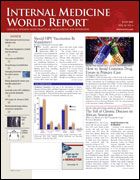Publication
Article
Internal Medicine World Report
HIV Infection Ups Myocardial Infarction Risk
Author(s):
Monitor Infected Patients for Coronary Artery Disease
Journal of Clinical Endocrinology and Metabolism
HIV infection correlates directly with an increased risk of heart attack in all infected patients, and the risk is especially high in women, investigators reported in the (2007 Apr 24. Online before print).
IMWR
"This is a well-done epidemiological study that shows an increased risk of myocardial infarction among HIV-infected patients compared with HIV-negative patients in a large US health system," Todd Brown, MD, assistant professor of medicine in the division of endocrinology and metabolism at Johns Hopkins University School of Medicine, Baltimore, told .
"This increased risk remained significant even after adjustment for traditional risk factors, even though the risk of these factors—diabetes, hypertension, and dyslipidemia—was higher among HIV-infected patients," said Dr Brown. "Notably, the increased risk of myocardial infarction between HIV-infected and HIV-negative patients was higher among women."
Previous studies have indicated that patients taking antiretroviral medications were at increased risk for myocardial infarction (MI), but scant research has been available on whether HIV-infected patients overall have more MIs than noninfected individuals.
The investigators analyzed data from the Research Patient Data Registry, which includes demographic and diagnostic information on >1.7 million patients treated at Massachusetts General Hospital and Brigham and Women's Hospital since 1993.
The study included nearly 4000 patients infected with HIV and >1 million patients without HIV. Eligible patients (aged 18-84 years) were examined at least twice during an 8-year period. Any patient diagnosed with an MI at the first visit was excluded from the study.
Analysis showed that the risk of MI was almost doubled among all HIV-infected patients compared with noninfected controls and almost tripled among HIV-infected women.
IMWR
"We need to study the relationship between antiretroviral medications and myocardial infarction risk; we are not saying that such patients should come off antiretroviral drugs, since such drugs are critical to keeping the virus under control," lead investigator Steven Grinspoon, MD, associate professor of medicine at Harvard Medical School, and clinical director, Neuroendocrine Clinical Center at Massachusetts General Hospital, told .
"However," he added, "the results emphasize how important it is to monitor for coronary artery disease and reduce the risk for coronary artery disease in this population with increased myocardial infarction risk."





